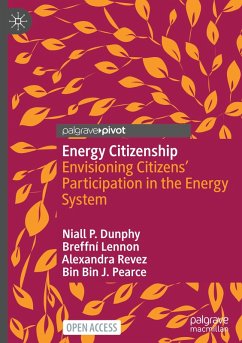
The Palgrave Handbook of Managing Fossil Fuels and Energy Transitions
Versandkostenfrei!
Versandfertig in 6-10 Tagen
151,99 €
inkl. MwSt.

PAYBACK Punkte
76 °P sammeln!
This Handbook is the first volume to comprehensively analyse and problem-solve how to manage the decline of fossil fuels as the world tackles climate change and shifts towards a low-carbon energy transition. The overall findings are straight-forward and unsurprising: although fossil fuels have powered the industrialisation of many nations and improved the lives of hundreds of millions of people, another century dominated by fossil fuels would be disastrous. Fossil fuels and associated greenhouse gas emissions must be reduced to a level that avoids rising temperatures and rising risks in suppor...
This Handbook is the first volume to comprehensively analyse and problem-solve how to manage the decline of fossil fuels as the world tackles climate change and shifts towards a low-carbon energy transition. The overall findings are straight-forward and unsurprising: although fossil fuels have powered the industrialisation of many nations and improved the lives of hundreds of millions of people, another century dominated by fossil fuels would be disastrous. Fossil fuels and associated greenhouse gas emissions must be reduced to a level that avoids rising temperatures and rising risks in support of a just and sustainable energy transition.
Divided into four sections and 25 contributions from global leading experts, the chapters span a wide range of energy technologies and sources including fossil fuels, carbon mitigation options, renewables, low carbon energy, energy storage, electric vehicles and energy sectors (electricity, heat and transport).They cover varied legal jurisdictions and multiple governance approaches encompassing multi- and inter-disciplinary technological, environmental, social, economic, political, legal and policy perspectives with timely case studies from Africa, Asia, Australia, Europe, North America, South America and the Pacific.
Providing an insightful contribution to the literature and a much-needed synthesis of the field as a whole, this book will have great appeal to decision makers, practitioners, students and scholars in the field of energy transition studies seeking a comprehensive understanding of the opportunities and challenges in managing the decline of fossil fuels.
Divided into four sections and 25 contributions from global leading experts, the chapters span a wide range of energy technologies and sources including fossil fuels, carbon mitigation options, renewables, low carbon energy, energy storage, electric vehicles and energy sectors (electricity, heat and transport).They cover varied legal jurisdictions and multiple governance approaches encompassing multi- and inter-disciplinary technological, environmental, social, economic, political, legal and policy perspectives with timely case studies from Africa, Asia, Australia, Europe, North America, South America and the Pacific.
Providing an insightful contribution to the literature and a much-needed synthesis of the field as a whole, this book will have great appeal to decision makers, practitioners, students and scholars in the field of energy transition studies seeking a comprehensive understanding of the opportunities and challenges in managing the decline of fossil fuels.














